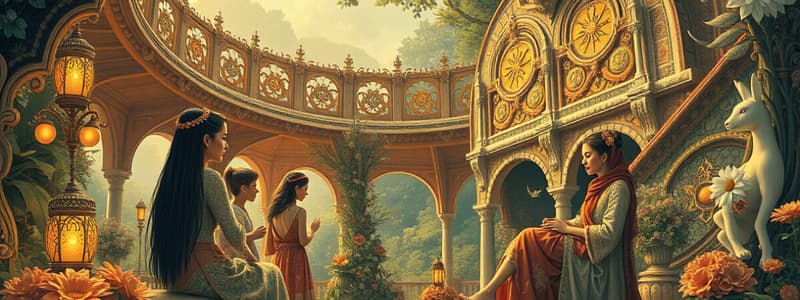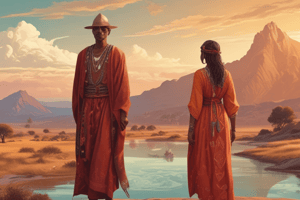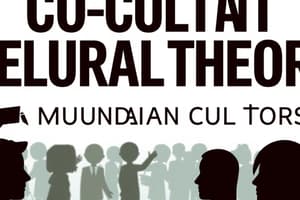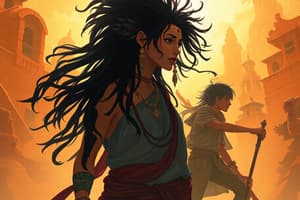Podcast
Questions and Answers
What is the dominant culture?
What is the dominant culture?
The dominant culture is the most powerful group in society, receiving the most support from major institutions and holding the most power and influence.
What is a subculture and how does it relate to the dominant culture?
What is a subculture and how does it relate to the dominant culture?
A subculture is a group whose values and norms differ from the dominant culture but co-exist within it.
What is a counterculture and how does it relate to the dominant culture?
What is a counterculture and how does it relate to the dominant culture?
A counterculture is a subculture that reacts against and opposes the values of the dominant culture.
What is popular culture and who shapes it?
What is popular culture and who shapes it?
How is the media's portrayal of Paddock, the Las Vegas gunman, an example of dominant culture?
How is the media's portrayal of Paddock, the Las Vegas gunman, an example of dominant culture?
What is ethnocentrism?
What is ethnocentrism?
What is cultural relativity?
What is cultural relativity?
Match the following concepts with their definitions:
Match the following concepts with their definitions:
Flashcards are hidden until you start studying
Study Notes
Dominant Culture
- Represents the most powerful group in society, gaining support from major institutions.
- Is characterized by the predominant belief system and has significant influence over social institutions.
- Common behaviors among members reflect the dominant values, shaping how society evaluates objects, ideas, and events.
Subculture
- Consists of cultural groups with values and norms differing from the dominant culture.
- Members interact frequently, sharing a common worldview without necessarily opposing the dominant culture.
- Maintains a cohesive system but varies in language, values, religion, and lifestyle aspects.
Counterculture
- Arises in reaction against the dominant culture's values and perceived oppression.
- Members actively reject dominant norms, creating practices that defy societal standards.
- Marked by nonconformity, and often retains its cultural identity as a form of resistance.
Popular Culture
- Mass-produced and widely consumed, it greatly influences public attitudes and values.
- It is constantly evolving and shaped by ongoing public interactions, reflecting changing societal norms.
Media Portrayal of Paddock
- The media emphasized his family background and upbringing to fit narratives aligned with the dominant culture.
- Paddock's lack of political or religious identity rendered him an outlier in a context where such affiliations were expected.
- Focus on familial explanations aligns with cultural norms that seek to find reasons for individual behavior based on social background.
Ethnocentrism
- Involves tendencies to view other cultures as inferior, illustrating belief in one's own culture's superiority.
- Examples include Florida classrooms emphasizing American culture without acknowledgment of other ethnic backgrounds.
- Policies in some schools have enforced ethnocentric views, promoting the idea that American values are superior.
Cultural Relativity
- Refers to the evaluation of a society's customs based on their own context rather than comparing them with others.
- An example includes the sacred status of cows in India, where their protection ties into economic factors that support local livelihoods despite hunger issues.
Ideologies, Norms, Folkways, and Mores
- Ideologies consist of shared beliefs regarding social and metaphysical realities, influencing views on governance and identity.
- Norms dictate societal expectations for behavior in various contexts, guiding individual actions in social situations.
Studying That Suits You
Use AI to generate personalized quizzes and flashcards to suit your learning preferences.




